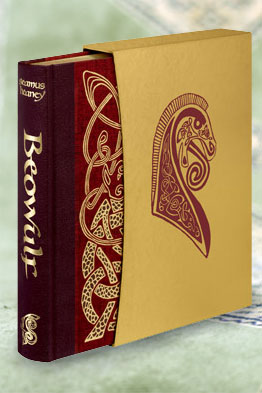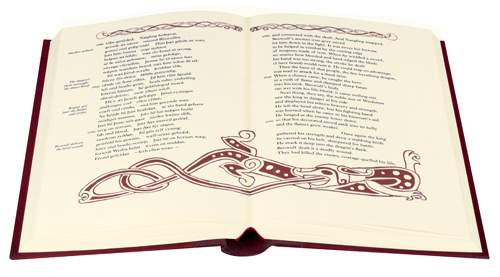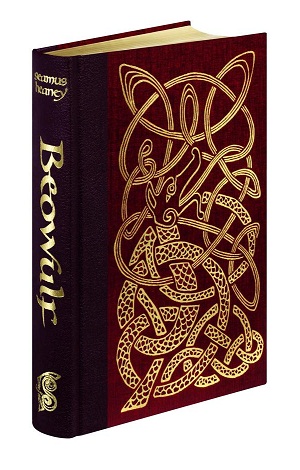Title: Beowulf
Author: unknown, Seamus Heaney (trans), Becca Thorne (illus)
ISBN: –
Publisher: The Folio Society, 2010
Condition: Quarter-bound in leather with cloth sides. Blocked with a design by the artist. Set in Imprint. Gilded top edge. 248 pages with borders throughout. 14 integrated footer illustrations.
Decorated title page. Book size: 11″ × 7¼”. New and perfect. Magnificent!
Beowulf – The greatest Old English epic poem
‘He has made a masterpiece out of a masterpiece’
ANDREW MOTION
The most famous and beautiful of all surviving Old English poems tells of the heroic deeds of Beowulf, a warrior and leader of the Geats, who travels to the land of the Danes to fight the monster Grendel and his lake-dwelling mother. After these epic encounters, he returns to his own land where he eventually becomes king and rules wisely. Yet fate is inescapable, and Beowulf must battle a third foe – the dragon.
Composed at some point between the mid-7th and late-10th centuries AD, Beowulf drew on an oral tradition that had been in existence for centuries, one with close connections to the Icelandic sagas. This was a warrior culture in which kings rewarded courage and loyalty with gifts of gold, where blood feuds were common, and the threat of invasion or raids was never far away – indeed many of the characters in Beowulf correspond to historical Scandinavian kings. Yet the world the poet evoked was already in the past; Christianity was changing both culture and literature. What we have is thus unique: a mingling of the pagan past and the Christian present.
Sometimes at pagan shrines they vowed
offerings to idols, swore oaths
that the killer of souls might come to their aid
and save the people. That was their way,
their heathenish hope; deep in their hearts
they remembered hell.
That the poem has come down to us at all is almost miraculous. It survived only in a manuscript produced in about 1000 AD, its brittle pages damaged by handling, fire and water, and not even copied until the 1780s. Such is the frail foundation of a work now seen as part of the bedrock of English literature and history – revealing a glimpse of the specifically Anglo-Saxon world that vanished with the Norman Conquest.
‘Heaney has created something imperishable and great that is stainless’
JAMES WOOD, GUARDIAN
One of the world’s greatest living poets, Nobel Prize-winner Seamus Heaney first studied and engaged with Beowulf some thirty-five years before he finally produced his awardwinning translation. In his introduction, included in our edition, he explores his linguistic relationship with the poem with exquisite sensibility. Passionate about the directness of the narrative and language, Heaney took inspiration from the farmers of his Irish family: ‘A simple sentence such as “We cut the corn to-day” took on immense dignity when one of the Scullions spoke it … And when I came to ask myself how I wanted Beowulf to sound in my version, I realised I wanted it to be speakable by one of those relatives.’
The project would prove all-consuming, as Heaney sought, and found, ‘the tuning fork [to give] the note and pitch for the overall music of the work’. The result is something quite extraordinary, no mere translation, but rather a great work in its own right – a renovation and re-envisioning.
‘I consider Beowulf to be part of my voice-right’
Seamus Heaney
A superb translation that breathes new life into an epic
All over the world students of English Literature begin their studies with the Old English epic Beowulf. Although few now become fully proficient in the complex West Saxon and Anglian dialects in which the poem was written, something of the strange beauty of their alliterative form and structure is grasped by everyone who sees the original. Every reader will gain immeasurably from being able to see the qualities of the Old English text in conjunction with a translation. There is, as Seamus Heaney puts it, ‘an undeluded quality about the Beowulf poet’s sense of the world which gives his lines immense emotional credibility… [with] the cadence and force of earned wisdom’.
‘Seamus Heaney’s new translation has released the poem from the syllabus back into literature’
JULIAN BARNES
Whitbread Book of the Year, 1999
The Folio Society commissioned Becca Thorne to design decorative borders for every page. Taking her inspiration from tapestries, illuminated manuscripts and the fine metalwork found in hoardes such as the Sutton Hoo treasure, she has produced narrow decorative borders throughout as well as 14 larger pictorial frames to illustrate key moments in the poem. Restrained, elegant and inventive, these scenes show Shield Sheafson’s body arrayed in armour in his funeral boat, the pyre of Beowulf with flames licking across the page, helmets piled up in the heaps of the slain, and the dragon coiled about his hoard.
This imposing fine edition is quarter-bound in leather with rich shot-burgundy cloth blocked in gold. More gold glimmers on the spine and on the top-edge gilding, a rich finish to recall the importance of gold in the poem: the reward of heroes from kings who are ring, gift and treasure givers, but also the useless ‘heathen gold’ guarded by the greed of dragons.
I heard he presented Hygd with a gorget,
the priceless torque that the prince’s daughter,
Wealhtheow, had given him; and three horses,
supple creatures, brilliantly saddled.
The bright necklace would be luminous on Hygd’s breast.
‘Seamus Heaney … an artist so exquisitely gifted and imaginatively capacious that only a work of such mighty scale would answer to his abilities’
TERRY EAGLETON, GUARDIAN





